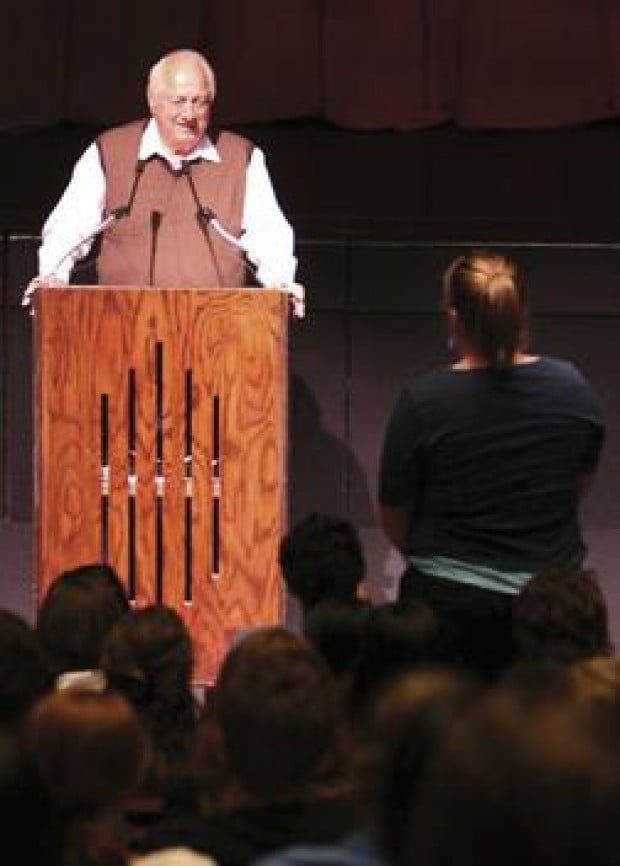
The famed Dodgers manager doles out advice to youth at Pepperdine seminar.
By Seth Rubinroit / Special to The Malibu Times
Hall of Fame manager of the Los Angeles Dodgers Tommy Lasorda addressed 260 high school students at the Southern California Youth Citizenship Seminar at Pepperdine University on Friday. The students who were accepted to participate in the free program were chosen from more than 1,200 applicants and 500 schools. The students, whose grade point averages ranged from 2.3 to 4.8, came from a variety of backgrounds.
“I love talking to youngsters,” said Lasorda, who has spoken at the seminar for the past 10 years. “It gives me an opportunity to impress upon them what it is going to take for them to make it in life.
“The most important message I want to try to get across is No. 1, for them to believe in themselves; No. 2, self confidence; and No. 3, to realize that they live in the greatest country in the world, the land of opportunity,” said Lasorda, who guided the Dodgers to World Series wins in 1981 and 1988.
Lasorda, who has been in the Dodger organization for 58 seasons and is currently the Dodger’s special advisor to the chairman, began his speech to the students with a story expressing how much he loves the Dodgers.
“When I got up early this morning to get here, my wife asked me, ‘Where are you going now?’ I said, ‘I have to go to Pepperdine and give a talk.’ She said, ‘I finally realized after being married to you for 57 years that you love the Dodgers and baseball more than you love me.’ I said, ‘Yes, but I love you more than I love football and basketball.'”
One thing separating Lasorda from most inspirational speakers is his ability to relate to the students. Rather than preaching to the teenagers, Lasorda used former players as examples of what can happen when you make bad choices.
“Why take drugs?” Lasorda asked. “What can it do for you? Does that make you any stronger or any prettier? It does absolutely nothing but lead you down the path of destruction. I have seen players that have gotten involved in drugs. I spoke with [former Dodger star] Darryl Strawberry last week. That guy could have been one of the greatest players in the game. What happened to him? Drugs.”
Lasorda also used compelling stories to illustrate his points.
For example, he told a story about three young men who received gifts upon their graduation to demonstrate the importance of working hard and earning what you get. The first dad handed his son keys to a car to reward him. The second father handed his son a large check. And, Lasorda said, “The third father went up to the third lad and said, ‘Your mother and I are very proud of you. You disciplined yourself, you worked hard, and you got yourself a good education. Good luck son.’ The son said, ‘Wait a minute, dad. You and mom did not get me anything.’ The dad said, ‘That’s where you are wrong. Your mother and I are giving you a much bigger gift than money or cars. I am giving you the world. Go out and earn it.'”
At the end of the speech, students were given the opportunity to ask Lasorda questions. One asked what Lasorda’s favorite piece of advice is, and Lasorda responded, “The difference between the possible and the impossible lies in an individual’s determination.”
Another student asked Lasorda how to stop the growing problem of illegal steroids and other performance-enhancing drugs in baseball.
“The reason the government is involved in baseball is because it has been documented that there are 500,000 high school students taking steroids. That is the thing they wanted to stop,” Lasorda said. “The only way to stop [steroids] is to penalize those who give it. If you penalize them and put them in prison, they will never do it again. That is the only way. And the only way you can stop it is not taking it, like with other drugs. You have got to be educated and know what it will do to you.”
In conclusion, Lasorda reminded the students “you can’t do anything about your last at bat, but you can do something about your next at bat.”
